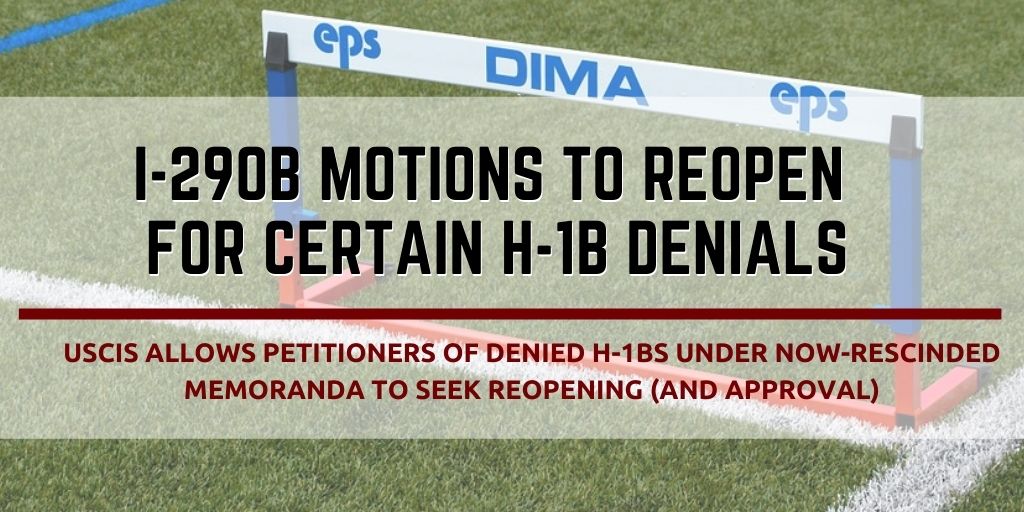USCIS Allows Petitioners of Denied H-1Bs Under Now-Rescinded Memoranda to Seek Reopening (and Approval)
USCIS has recently announced that they will allow H-1B petitioners of certain denied H-1B petitions to petition USCIS to reopen (and hopefully, approve) the denial decision in light of certain now-rescinded policy memoranda (third-party worksite placements’ right to control and empoyer-employee relationship and the specialty occupation nature of the computer programmer position).
Which H-1B Denials Are Eligible to File Motion to Reopen?
According to USCIS, the following types of denied H-1B petitions are eligible to file motion to reopen:
- H-1B petition denials which are solely based on the third-party placement and specifically due to lack of right to control or employer-employee relationship between the petitioner and the beneficiary, OR
- H-1B petitions denied solely on the fact that the computer programmer position was not deemed to be specialty occupation.
Procedure and Deadline to Submit Motion to Reopen
USCIS is inviting petitioner with qualifying denied H-1B petitions to submit a Form I-290, Notice of Appeal or Motion, with fee, and with a brief explaining the error.
Normally, the deadline to submit a Motion to Reopen is 30 days (or 33 days if denial notice was received via mail) from the date of the denial decision; however, USCIS has the discretionary authority to accept and consider untimely motions under certain circumstances. So, while it may be possible to seek to reopen denials that are months old, we urge petitioners to try to do so as soon as possible.
Is It Always a Good Idea to File a Motion to Reopen for Qualifying Denied H-1B Case?
We do not believe that this opportunity would fit (or would make sense) for every H-1B denial which meets the eligibility requirements.
First, the Motion to Reopen process takes time – many months in most cases – so petitioners should evaluate whether the requested H-1B petition validity dates and circumstances are still valid.
Example: the denied H-1B petition had requested end date of December 1, 2020; a motion to reopen (and subsequent approval) would only grant validity until this date.
A situation in which it may make sense to file a Motion to Reopen even for a petition which may be expired is if the beneficiary has a gap in status and/or has accrued unlawful presence. Filing a Motion to Reopen (and the subsequent approval) may cure a past period of unlawful presence.
Second, cases which were denied for multiple reasons – for example, for lack of specialty occupation AND insufficient documentation of employer-employee relationship – may still not be successful in the Motion to Reopen if the petitioner cannot convince USCIS that all denial reasons were incorrect.
Conclusion
While we welcome USCIS allowing this opportunity to seek reopening of certain denied H-1B petitions; unfortunately, our experience suggests that not all H-1B petitions would directly benefit from this option.
If you wish to have our office analyze a specific case or situation as to whether it may benefit from submitting a Motion to Reopen under this guidance, please contact us as soon as possible. Our attorneys and professionals stand ready to review your case, as part of our free initial consultation, and will help you prepare a strong Motion to Reopen application. Also, we invite you to subscribe to our free weekly newsletter to obtain further news and developments on this topic.
Related News and Articles
The Capitol Immigration Law Group has been serving the business community for over 15 years and is one of the most widely respected immigration law firms focused solely on U.S. employment-based immigration. Disclaimer: we make all efforts to provide timely and accurate information; however, the information in this article may become outdated or may not be applicable to a specific set of facts. It is not to be construed as legal advice.

